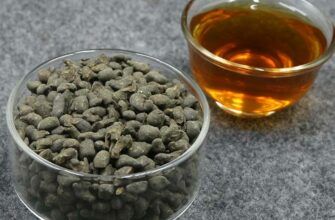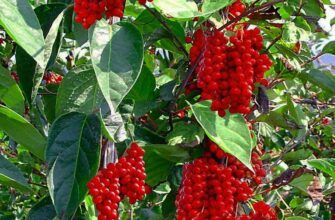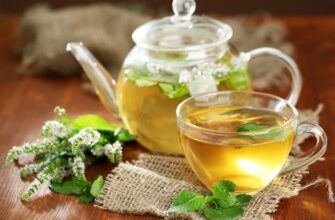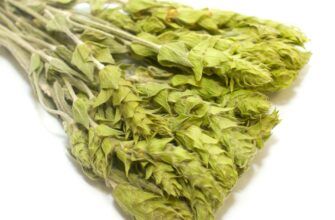Burdock root tea has been highly valued throughout the world for thousands of years for its ability to purify the blood and reduce internal heat. Whether you take it internally or externally, it always has anti-inflammatory and antibacterial effects.
Recent studies also show that burdock root contains phenolic acids, quercetin and luteolin, which are powerful antioxidants that help promote and maintain health.
Burdock has a nice crunchy texture and an earthy, sweet flavor similar to lotus root or celery. Burdock has a number of amazing properties, including medicinal uses in the treatment of serious chronic diseases such as cancer and diabetes!
- Useful properties of burdock root
- Blood Purification
- Strengthening the lymphatic system
- natural diuretic
- Skin healer
- Protection against diabetes
- Oncoprotector
- Prevents the onset of arthritis
- Helps with an enlarged spleen
- Treatment of tonsillitis
- Burdock Root Nutrition Facts
- Interesting facts from the history of burdock root
- How to make tea with burdock root
- Burdock Root Recipes
- Possible side effects and contraindications
Useful properties of burdock root
The beneficial properties of burdock are truly amazing. Here are some of its properties that help improve your health.
Blood Purification
In traditional herbal writings, burdock root tea is often referred to as a "blood purifier". It is believed that it cleanses the blood of toxins. The composition of burdock includes active substances that promote the removal of heavy metals from the blood, which improves the condition of the organs and the health of the body as a whole. It also promotes blood flow to the surface of the skin.
Strengthening the lymphatic system
Essentially, the lymphatic system is the body's internal "drainage system" consisting of a network of blood vessels and lymph nodes that carry fluids from body tissues to the blood and vice versa. If you make your lymphatic system stronger, then you can help your body prevent almost all kinds of diseases and serious health problems. Burdock root tea helps stimulate lymphatic drainage and detoxify the body. As a natural blood purifier, it has an amazing effect on the lymphatic system.
natural diuretic
Diuretics stimulate the kidneys and help the body get rid of excess fluid, mainly water and sodium. Burdock root tea is a natural diuretic, so consuming burdock root can easily and naturally help your body eliminate excess water by increasing urine output. As a diuretic, burdock root helps remove waste from the blood and body.
If you have problems with fluid retention in the body, before starting medication, consult your doctor about an alternative in the form of taking a decoction of burdock root.
Skin healer
For centuries, preparations containing burdock root have been used in the treatment of skin conditions ranging from acne to psoriasis and eczema. Eating burdock has also helped many people with skin problems due to burdock's ability to purify the blood and cool internal heat.
Scientific studies have shown that burdock extract can reduce the clinical signs of skin aging! A 2008 study showed that topical treatment with burdock root led to a significant improvement in dermal matrix metabolism and a visible reduction in wrinkles. Burdock root is increasingly used in skin care products, especially for mature and dry skin.
Protection against diabetes
Burdock root contains inulin, a soluble fiber that helps improve digestion and lower blood sugar, making it a great choice for people trying to regulate their blood sugar naturally. In Europe, fresh burdock root is used to lower blood sugar levels. The inulin contained in the root makes it an excellent remedy for diabetic patients. Animal studies have also shown the ability of burdock root to reduce the severity of diabetic complications, especially diabetic retinopathy.
Oncoprotector
European doctors of the Middle Ages used burdock to treat cancerous tumors (as well as skin diseases, venereal diseases, bladder and kidney diseases). Today, many herbalists are talking about how burdock root can stop cancer cells from metastasizing, making it a potential natural cure for cancer. Studies conducted on animal mammary glands, intestines and pancreas affected by cancer have shown promising properties of burdock root in the fight against cancer cells.
Oncoprotective properties of burdock root are determined by the presence of arctigenin in its composition. Arctigenin is an active substance found in several plants of the Asteraceae family, including greater burdock (arctium lappa). This substance has been shown to selectively stop the spread of cancer cells and suppress their growth, inhibits the production of certain proteins (NPAT proteins), and therefore paralyzes the ability of cancer cells to reproduce.
Another study showed that arctigenin successfully destroyed lung, liver, and stomach cancer cells. The results of these studies prove what many have believed for years - burdock root is effective in fighting cancer!
Prevents the onset of arthritis
Burdock root is known for its powerful anti-inflammatory properties to help treat arthritis. A study found that burdock root tea improved inflammation and reduced oxidative stress in patients with osteoarthritis of the knee, also known as degenerative joint disease.
The subjects were given three cups of burdock root tea a day for forty-two days, and then their tests were evaluated for the presence of inflammatory markers such as highly sensitive C-reactive protein. The results of the study showed that burdock root tea can significantly help people suffering from osteoarthritis by lowering inflammatory markers.
Helps with an enlarged spleen
If you are suffering from an enlarged spleen, burdock root tea can help. The spleen is a vital "defensive" organ that protects our body from the effects of infections, viruses, and other pathogens. An enlarged spleen is a clear signal that the immune system is in an extremely stressed state and is fighting a threat, but is not able to eliminate this threat completely, because the scale of the pathogen is too large.
The spleen is in constant contact with the blood, as burdock root purifies the blood, it also purifies and protects the spleen. Burdock root improves blood quality as well as keeps the liver healthy, regulates circulation and fights inflammation. These four factors have a direct positive impact on the health of the spleen. So if you want to maintain the health of this extremely important organ, then add burdock root tea to your diet.
Treatment of tonsillitis
Burdock root can help get rid of tonsillitis. Acute tonsillitis is an inflammatory viral disease caused by infection of the tonsils with pathogenic bacteria. Burdock root is useful in the treatment of tonsillitis, it speeds up the healing of wounds, reduces inflammation and helps to get rid of coughs and sore throats.
Burdock Root Nutrition Facts
Burdock root (Arctium species) is a biennial plant of the Asteraceae family, which is native to northern Asia and Europe, but has already been introduced to the United States, where it is considered a weed. In Japan, it is often called gobo root and burdock is grown as a vegetable.
Burdock has large, heart-shaped leaves and bright, rose-red to purple flowers like a thistle. It also has burrs that can cling to clothing or animal hair. The deep roots of burdock are brown-green or almost black on the outside.
Burdock root is an oblong, brown-skinned root vegetable that typically grows over half a meter in length. It consists mainly of carbohydrates, essential oils, plant sterols, tannins and fatty oils.
The nutritional value of one cup of burdock root tea is approximately as follows:
- 85 kcal
- 20.5 g carbohydrates
- 1.8 g protein
- 0.2 g fat
- 3.9 g fiber
- 0.3 mg vitamin B6 (14% DV)
- 0.3 mg manganese (14% DV)
- 44.8 mg magnesium (11% DV)
- 363 mg potassium (10% DV)
- 27.1 mcg folate (7% DV)
- 3.5 mg vitamin C (6% DV)
- 60.2 mg phosphorus (6% DV)
- 48.4 mg calcium (5% DV)
- 0.9 mg iron (5% DV)
- 0.1 mg copper (5% DV)
Interesting facts from the history of burdock root
Burdock root has been used for thousands of years in Asia and Europe and has only recently made its appearance in North America. In Japan, it is mainly consumed as a vegetable, usually eaten fresh or boiled, and the young leaves are cooked just like any other vegetable.
In traditional Chinese medicine, burdock root tea has been used for thousands of years. It is generally used for diseases of the lungs and meridians of the stomach, as well as to cool the internal heat and maintain healthy skin. In European folk medicine, burdock seed infusion is often used as a diuretic and to support healthy digestion.
Would you believe that burdock burdock became a kind of prototype for creating a textile fastener - Velcro? In 1941, an inventor, a Swiss engineer named Georges de Mestral, went for a walk in the woods and, looking at a burdock clinging to his pants and his dog's fur, wondered if something useful could come out of it. After nearly eight years of research, de Mestral successfully replicated this effect with two strips of fabric, one with a thousand tiny hooks and the other with a thousand tiny loops. He named his invention velcro and formally patented it in 1955.
Burdock root has been used for centuries as a medicinal herb used to promote healthy hair, relieve skin irritation and improve scalp condition. In Europe, burdock root oil, also known as burdock oil, is widely used as a scalp treatment to prevent hair loss and get rid of dandruff. All of the benefits found in burdock that help your skin and blood can also help improve your hair and keep your scalp healthy.
How to make tea with burdock root
Burdock root can be found fresh or dried. Fresh burdock root is often found in health food stores and Asian specialty stores.
Burdock root should always be washed well, and you can also peel it like a carrot if you don't like its skin. Peeled, dry roots may not spoil for several months if stored in a cool, well-ventilated area. Cut or peeled fresh roots should be stored in the refrigerator and used as soon as possible.
Some people consume large quantities of wild burdock root, but this may carry some risk. Burdock roots can accumulate toxins, so you need to be absolutely sure that you are consuming roots grown away from roads, industrial sites, and areas that may have been sprayed with pesticides. If you are going to collect wild burdock roots yourself, you should be sure on the 100% that you can find it and can distinguish it from other plants. People sometimes confuse young burdock with digitalis, which is highly toxic. This health-threatening mistake is very easy to make.
Burdock Root Recipes
Step 1
You need to carefully choose a fresh burdock root, it should be firm and not too soft. Its color can be very dark, like the bark of a tree, or lighter, closer to the color of parchment paper. You should not store it for a very long time, if you do not make tea from the root, add it to the soup, it will turn out delicious too.
Step 2
Clean the burdock root: you can simply scrape it with a knife if the root is old, or just wipe it with a clean cloth if the root is young. If you can't find fresh burdock root, you can use 1 tablespoon of dried burdock root, dried and aged for at least a year.
Step 3
Coarsely chop about 2 tablespoons of the root and place in a small stainless steel saucepan. Add 3 cups of filtered or spring water. Bring to a boil, then reduce heat to simmer for 30 minutes.
Step 4
Let it brew for another 20 minutes. Serve hot. Drink throughout the day as a detox tea. Remember, like many herbal teas, burdock root tea is a diuretic, so don't overdo it.
Possible side effects and contraindications
Burdock root tea is considered quite safe when consumed as a food, for example, as it is consumed in Asian countries. However, pregnant and breastfeeding women should avoid taking it as it may harm the baby.
If you are dehydrated, don't take burdock, because of its diuretic effect, it can aggravate your problem. In addition, if you are sensitive to plants in the Asteraceae family, which includes ragweed, chrysanthemums, marigolds, and daisies, you may experience allergic reactions, including dermatitis.
Since burdock often grows in close proximity to belladonna or belladonna (Atropa belladonna), there is a risk that burdock preparations may contain toxins acquired as a result of such proximity. Therefore, always try to buy burdock root products from trusted and well-known manufacturers.
There are no scientific claims about interactions between burdock and conventional medications. However, if you are taking diuretics (burdock may increase their effects), diabetes medications (burdock oil may lower blood sugar levels, cause hypoglycemia), or blood thinners (burdock may slow blood clotting and, when combined with blood thinners, blood medications, increase the risk of bruising or bleeding), it is recommended that you first consult your doctor before taking burdock root preparations.
If you are preparing for any type of surgery, it is best to stop taking burdock root at least two weeks before surgery. Burdock can increase the risk of bleeding during and after surgery.
There are no scientific statements about the effect of burdock on the children's body, so you can give burdock root to children only under the supervision of a doctor.
Read more:





